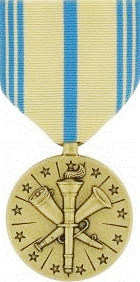 W
WThe Armed Forces Reserve Medal (AFRM) is a service medal of the United States Armed Forces that has existed since 1950. The medal recognizes service performed by members of the reserve components and is awarded to both officers and enlisted personnel. The medal is considered a successor award to the Naval Reserve Medal and the Marine Corps Reserve Ribbon, which were discontinued in 1958 and 1967, respectively.
 W
WThe Army General Margelov Medal is an award of the Ministry of Defence of the Russian Federation established by Order No. 182 of the Minister of Defence of the Russian Federation of 6 May 2005. It is named after the renowned past commander of Soviet Airborne Troops Army General Vasily Margelov. The medal is awarded to military and civilian personnel of the Russian Airborne Troops for good service.
 W
WThe Badge of Honour for Fire Protection is an award of the Free State of Thuringia for extraordinary commitment given to members of fire brigades in five ranks.
 W
WThe Bayerische Verfassungsmedaille is an award by the German state Bavaria, which is awarded annually by the Bavarian state parliament to persons who have rendered outstanding services to the Bavarian constitution. The medal is given in Silver and Gold.
 W
WThe Blood Order, officially known as the Decoration in Memory of 9 November 1923, was one of the most prestigious decorations in the Nazi Party (NSDAP). During March 1934, Hitler authorized the Blood Order to commemorate the 9 November 1923 coup attempt of the Nazi Party. The medal is silver, with the obverse bearing a depiction of an eagle grasping an oakleaf wreath. Inside the wreath is the date 9.Nov. and to the right is the inscription München 1923–1933. The reverse shows the entrance of the Feldherrnhalle in relief, and directly above is the angled swastika with sun rays in the background. Along the top edge is the inscription: UND IHR HABT DOCH GESIEGT.
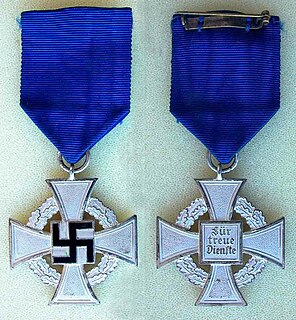 W
WThe Civil Service Faithful Service Medal was a Nazi Germany medal of honor that was founded on 30 January 1938, in two grades, to reward civilians and military in the employ of the German public services for long and faithful service.
 W
WThe Colonial Prison Service Medal was established on 28 October 1955 as a long service medal of the United Kingdom and the Commonwealth. On 10 April 2012 the medal became known as the Overseas Territories Prison Service Medal, and underwent a minor change in design. This reflected the change in the way Britain's remaining colonies were described, they having been classed as 'Overseas Territories' from 2002.
 W
WThe Corrections Exemplary Service Medal is a Canadian service medal for correctional officers and employees.
 W
WThe Cross of Honour for Military Service Abroad is a Belgian military decoration originally established for award to Belgian servicemen who served for a long period of time in the Federal Republic of Germany, Zaire, Rwanda or Burundi. It was established on 16 June 1997 in three classes.
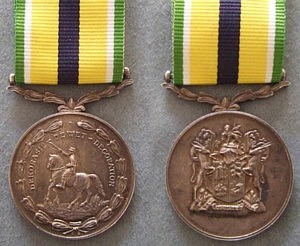 W
WThe De Wet Decoration, post-nominal letters DWD, is a military long service decoration which was instituted by the Republic of South Africa in 1965. It could be awarded to members of the Commandos, the rural civil defence component of the South African Defence Force, for twenty years of efficient service and good conduct. The decoration was initially reserved for officers, but it was made available to all ranks in 1986. A clasp could be awarded after thirty years service.
 W
WThe Decoration "For Impeccable Service" is a state decoration of the Russian Federation aimed at recognising impeccable civilian or military service to the state beyond the scope of normal long service medals.
 W
WThe Defence Long Service Medal is an Australian military award given for long service by permanent and reserve members of the Australian Defence Force (ADF), irrespective of rank. It was introduced in 1998, and replaced the suite of ADF service awards introduced in 1982, which comprised the Defence Force Service Medal, the Reserve Force Medal and the Reserve Force Decoration.
 W
WThe Distinguished Eagle Scout Award (DESA) is a distinguished service award of the Boy Scouts of America (BSA). It is awarded to an Eagle Scout for distinguished service in his profession and to his community for a period of at least 25 years after attaining the level of Eagle Scout. Other requirements include significant accomplishment in one's career and a solid record of continued community volunteer involvement. It is one of only two BSA awards given to adults that is dependent upon the recipient's having been awarded Eagle Scout as a youth; the other is the NESA Outstanding Eagle Scout Award (NOESA). Recipients of the DESA are known as Distinguished Eagle Scouts.
 W
WThe Emergency Reserve Decoration (ERD) was a British military decoration for long service, instituted on 17 November 1952 and given for service up to 1967.
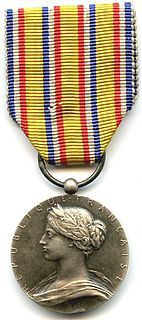 W
WThe Honour medal for firefighters is a state decoration of France bestowed by the Ministry of the Interior to members of the French Fire Service.
 W
WKnown for a long time as the President’s medal, the Honour medal of Foreign Affairs is a state decoration bestowed by the French Republic in the form of an honour medal for work. It was originally created by a Royal decree of 28 July 1816 as a single grade medal to reward acts of courage displayed by French nationals on foreign soil. An 1861 Imperial decree saw it be split into the silver and gold grades. The year 1887 saw the addition of swords to the medal for award to both French or allied military personnel for acts of courage in favour of the French in time of war. Although still bestowed in wartime for courage, the modern award is now aimed at rewarding civil servants of the ministry for Foreign Affairs.
 W
WThe Honour medal of railroads is a state decoration bestowed by the French Republic in the form of an honour medal for work. It was originally meant to reward, depending on the quality and length of time calculated in calendar years, the services rendered by French agents and labourers and to nationals of the French Union or protectorates, in service with the railroads. The Honour medal of railroads was created by decree on 19 August 1913 as a reward for thirty years of service. Since then, many modifications were instituted by consecutive decrees amending the original text.
 W
WThe Honour medal of the National Police is the highest award of the French National Police, which falls under the jurisdiction of the Ministry of the Interior.
 W
WThe Imperial Service Medal (ISM) is a medal affiliated with the Imperial Service Order. The medal was established under the statutes of the Imperial Service Order, on 8 August 1902, by King Edward VII, with the first awards appearing in the London Gazette in May 1903.
 W
WThe John Jacob Rogers Award is an obsolete award of the United States Department of State. It has since been replaced with the Secretary’s Career Achievement Award. It was presented to retiring career employees in the Department who, over a period of 25 years or more, of U.S. government or military service, performed with dedication and distinction.
 W
WThe Order of Lenin, named after the leader of the Russian October Revolution, was established by the Central Executive Committee on April 6, 1930. The order was the highest civilian decoration bestowed by the Soviet Union. The order was awarded to:Civilians for outstanding services rendered to the State Members of the armed forces for exemplary service Those who promoted friendship and cooperation between peoples and in strengthening peace Those with meritorious services to the Soviet state and society
 W
WThe Long Service Medal, Bronze was instituted by the President of the Republic of Venda in 1985, for award to all ranks for ten years exemplary service.
 W
WThe Long Service Medal, Gold was instituted by the President of the Republic of Venda in 1985, for award to all ranks for thirty years exemplary service.
 W
WThe Long Service Medal, Silver was instituted by the President of the Republic of Venda in 1985, for award to all ranks for twenty years exemplary service.
 W
WThe Maurician medal is an honorary degree granted to a soldier, after 50 years of service in the Italian army. This medal was established by Carlo Alberto di Savoia, on 19 July 1839 on decree of the Regie Magistrali Patenti, with the name of "Maurician Medal to the Military Merit of Ten Lustrums". It became official with royal decree of 21 December 1924. The "Maurician Medal to the Military Merit of Ten Lustrums" would then be replaced, by the law n. 203 of 7 May 1954, with the "Maurician Medal to the merit of ten lustrums of military career".
 W
WThe Military Health Service honour medal is a French decoration created 30 August 1962. The medal recognizes individuals who have contributed or lent their support to the French Defence Health service and were particularly marked by their services or their dedication. It is presented in four different levels: gold, vermeil, silver, and bronze. It may be awarded to members of the military as well as civilians.
 W
WThe Medal "For Impeccable Service" was a Soviet military award for long service awarded to deserving members of the military personnel of the armed forces of the USSR, of the Interior Ministry of the USSR and of the Ministry for the Protection of Public Order of the USSR, to recognise ten, fifteen and twenty years of faithful and impeccable service to the state.
 W
WThe Medal For Military Service to Ukraine is an award of Ukraine. It was established by the Decree of the President of Ukraine Leonid Kuchma on October 5, 1996 to honour servicemen of the Armed Forces of Ukraine and other military formations created in accordance with the Ukrainian legislature and other individuals for courage and valor displayed at protection of state interests and for excellent execution of service duty.
 W
WThe Medal "Veteran of the Armed Forces of the USSR" was a long service award of the Armed Forces of the Soviet Union established on May 20, 1976 by decree of the Presidium of the Supreme Soviet of the USSR and awarded for twenty-five years of impeccable service to troops of the army, navy, of internal forces and of border troops. Its statute was twice amended by further decrees of the Presidium of the Supreme Soviet of the USSR, first on July 18, 1980 and lastly on January 10, 1984.
 W
WThe Meritorious Service Medal (MSM) is a silver medal for distinguished service, or for gallantry, principally by non-commissioned officers of all of the British armed forces and of Queen Alexandra's Royal Naval Nursing Service.
 W
WThe Military Decoration is a military award of the Kingdom of Belgium. It was established on December 23, 1873 and is awarded to non-commissioned officers and other ranks of the Belgian Armed Forces for loyal and uninterrupted service. Early in the 20th century, 2 classes for the medal were created.
 W
WThe National Medal is an Australian award given for long service by operational members of specified eligible organisations. It was introduced in 1975, as an original component of the new Australian honours system, and replaced a range of medals available to military and civilian uniformed services for long service and good conduct. The eligible groups have in common that their members serve or protect the community at the risk of death, injury or trauma, hence it is only available to members of the eligible organisations who are operationally deployed. In the case of corrective services, eligibility is restricted to officers with custodial duties.
 W
WThe Nazi Party Long Service Award, sometimes called the NSDAP Long Service Award, was a political award in the form of a badge of the Nazi Party.
 W
WThe Order of Agricultural Merit is an order of merit bestowed by the French Republic for outstanding contributions to agriculture. When it was created in 1883, it was second in importance only to the Legion of Honour within the French order of precedence.
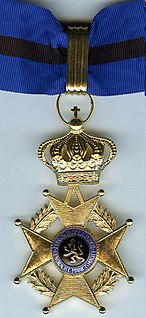 W
WThe Order of Leopold II is an order of Belgium and is named in honor of King Leopold II. The decoration was established on 24 August 1900 by Leopold II as Sovereign of the Congo Free State and was in 1908, upon Congo being handed over to Belgium, incorporated into the Belgian awards system. The order is awarded for meritorious service to the sovereign of Belgium, and as a token of his personal goodwill. It can be awarded to both Belgians and foreigners, and is seen as diplomatic gift of merit.
 W
WThe Permanent Force Good Service Medal was instituted by the Republic of South Africa in 1961, when South Africa became a republic, to replace the Union Medal. It was awarded to Permanent Force members of the South African Defence Force for eighteen years of service and good conduct.
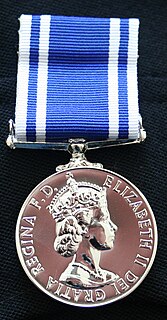 W
WThe Police Long Service and Good Conduct Medal is a decoration for police officers of the United Kingdom. First instituted in 1951, the medal is presented for twenty aggregate years of service in the police services of the United Kingdom.
 W
WThe Police Long Service Award (Germany) (Polizei-Dienstauszeichnung) was a long service medal awarded to active members of the German Police during the era of Nazi Germany as a political award. Professor Richard Klein designed the awards, which varied slightly in design depending on the length of service of the recipient.
 W
WThe Reserve Force Medal (RFM) is an Australian Military award given for long service by non-commissioned members of the Reserve Forces. It is part of the suite of defence force service awards introduced in 1982, which also included the Defence Force Service Medal and the Reserve Force Decoration. All three medals were replaced in 2002 with a single medal, the Defence Long Service Medal, which is now awarded to all permanent and reserve members irrespective of rank.
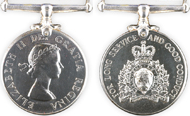 W
WThe Royal Canadian Mounted Police Long Service Medal was established by royal warrant on 6 March 1934 by King George V. It is the oldest continually awarded honour within the Canadian honours system, and the first created specifically for Canadian service within Canada. Initially proposed by the Royal Northwest Mounted Police Veterans’ Association, it took more than ten years for the proposal to be realized. The determination of the veterans was aided by the interest of Commissioner Cortlandt Starnes and Prime Minister R.B. Bennett.
 W
WThe Royal Medal of Recompense is a Danish medal. Established by King Christian IX the medal is presented at the prerogative of Monarch. Currently, it is awarded for 40 or 50 years of service to the same private employer.
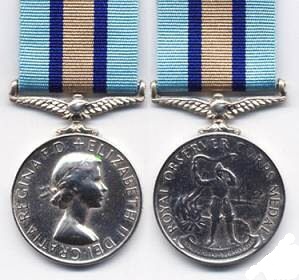 W
WThe Royal Observer Corps Medal was instituted in 1950 by King George VI for long service by members of the Royal Observer Corps (ROC) in the United Kingdom. It was awarded until December 1995, when the ROC was stood down.
 W
WThe Secretary’s Career Achievement Award is an award of the United States Department of State. It is presented to retiring career employees in the Department who, over a period of 25 years or more, of U.S. Government and/or military service, have performed with dedication and distinction.
 W
WThe Service Medal of the Order of St John is awarded to recognise both conspicuous and long service with the Venerable Order of St John, particularly in St John Ambulance, both in the United Kingdom and in a number of other Commonwealth countries. The award was announced in the St John Ambulance Brigade General Regulations for 1895 and minted in 1899, though the first honourees had been selected the previous year.
 W
WThe Singapore Armed Forces Long Service and Good Conduct Medal is awarded to a member of the Singapore Armed Forces (SAF) who has completed 20 years of continuous service.
 W
WThe Sri Lanka Armed Services Long Service Medal is a service award presented to all ranks of the tri-forces of Sri Lanka. Service personnel are eligible for the award on the completion of 12 years' continuous service with perfect character and discipline. General officers commanding/area commanders/commanding officers forward recommendations to service commanders. Reserve- or volunteer forces may qualify for this award provided that their service periods add up to 12 years.
 W
WSS Long Service Awards were given in grades of four years, eight years, twelve years, and twenty-five years. The four and eight-year service awards were in the form of circular medals while the 12 and 25-year service awards were in the form of swastikas. The SS service awards were designed in Munich by Professor Karl Diebitsch. The awards varied in design depending on the length of service of the recipient.
 W
WThe Order of the Red Star was a military decoration of the Soviet Union. It was established by decree of the Presidium of the Supreme Soviet of the USSR of 6 April 1930 but its statute was only defined in decree of the Presidium of the Supreme Soviet of the USSR of 5 May 1930. That statute was amended by decrees of the Presidium of the Supreme Soviet of the USSR of 7 May 1936, of 19 June 1943, of 26 February 1946, of 15 October 1947, of 16 December 1947 and by decree No 1803-X of 28 March 1980.
 W
WThe Texas Superior Service Medal is the fourth highest military decoration that can be conferred to a service member of the Texas Military Forces. It can also be conferred to civilians. No devices are authorized for this decoration.
 W
WThe Union Medal was instituted by the Union of South Africa in 1952. It was awarded to Permanent Force members of the South African Defence Force for eighteen years of service and good conduct.
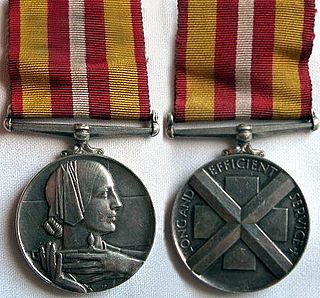 W
WThe Voluntary Medical Service Medal is a medal awarded by the British Red Cross and St Andrew's First Aid. It was instituted in 1932 at the direction of George V.
 W
WThe Wehrmacht Long Service Award was a military service decoration of Nazi Germany issued for satisfactory completion of a number of years in military service.